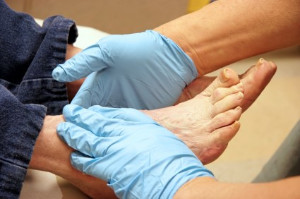How Foot Function in Diabetic Patients Relates to Limb Salvage

Diabetes can lead to peripheral neuropathy and poor circulation, making the foot more vulnerable to injuries. Altered foot biomechanics, such as abnormal pressure distribution or foot deformities, can increase the risk of ulcers, particularly in weight-bearing areas like the heel or ball of the foot. Without the protective sensation due to neuropathy, individuals may not notice injuries, which, combined with poor healing due to impaired circulation, can escalate to infections or deep tissue damage. This increases the risk of gangrene and amputation. Limb salvage focuses on correcting or accommodating these biomechanical issues to prevent ulceration and promote healing. This may involve custom orthotics, offloading devices, or surgical intervention to correct deformities. Early detection, proper foot care, and regular monitoring are essential to avoid complications and preserve limb function in diabetic patients. If you have diabetes, it is strongly suggested that you visit a podiatrist regularly to have your feet examined, so any abnormalities or injuries can be promptly treated.
Diabetic Limb Salvage
Diabetic limb salvage can be an effective way in preventing the need for limb amputation. If you have a foot ulcer and diabetes, consult with the podiatrists from Boston Common Podiatry. Our doctors will assess your condition and provide you with quality foot and ankle treatment.
What Is Diabetic Limb Salvage?
Diabetic limb salvage is the attempt of saving a limb, such as the foot, that has an infected ulcer, from amputation. Podiatrists also try to make sure that there is enough function in the foot after the salvage that it is still usable. Those with diabetes experience poor blood circulation, which prevents proper healing of an ulcer. If the ulcer is left uncheck, it could become infected, which could result in the need for amputation.
Diabetes is the number one cause of non-traumatic amputations in the United States. Amputation has been found to lead to higher mortality rates. This translates into higher healthcare costs, and a reduced quality of life and mobility for amputees. Podiatrists have attempted to increase the prevalence of limb salvage in an attempt to solve these issues.
Diagnosis and Treatment
Limb salvage teams have grown in recent years that utilize a number of different treatments to save the infected limb. This includes podiatrists that specialize in wound care, rehabilitation, orthotics, and surgery. Through a combination of these methods, limb salvage has been found to be an effective treatment for infected limbs, and as an alternative to amputation. Podiatrists will first evaluate the potential for limb salvage and determine if the limb can be saved or must be amputated.
If you have any questions, please feel free to contact our office located in Boston, MA . We offer the newest diagnostic and treatment technologies for all your foot care needs.





